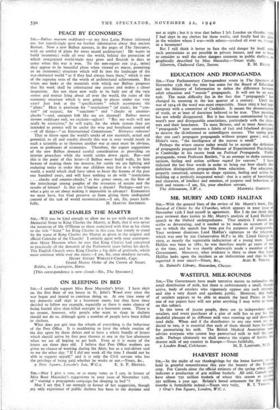PEACE BY ECONOMICS
Sin,—Balbus murum oedificavit—so my first Latin Primer informed me, but tantalisingly gave no further information about that ancient Roman. Now a new Balbus appears, in the pages of The Spectator, with an armful of plans for more mural architecture! He wants to build (economic) walls all over the world, behind the protection of which reorganised world-trade may grow and flourish in days to come when this war is won. To the non-expert eye (e.g., mine) they appear to be beautiful plans when viewed en masse, promising us an (economic) structure which will fit into the landscape of the war-shattered world "as if they had always been there," which is one of the supreme tests of the worth of architectural achievement. But when one looks at the materials with whick our Balbus proposes that his work shall be constructed one pauses and makes a closer inspection. Are not these new walls to be built out of the very stones and mortar lying about all over the world, the ruins of the economic structure which is now going to pieces under our very eyes? Just look at the " specifications " which accompany the "plans." Here is provision for " restrictions " (of trade), for " con- trol " (of output), for " sanctions " and "checks or counter- checks "—and, unexpert folk like me are alarmed! Balbus muros iterum oedificare mit, we exclaim—aghast! "But my walls will not really be restrictive," he will reply, for the whole system they are intended to protect will be under the wise and beneficent control of —of all things—" an International Commission." Horresco referens!
That to throw open the world's stocks of raw materials, actual and potential, to all and sundry directly this war is over would result in such a scramble as to threaten another war at once must be obvious, even to professors of eConomics. Therefore, the expert suggestions of the new Balbus demand careful consideration as providing an interim procedure while the world settles down again. But—and this is the point of this letter—if Balbus must build walls, let him beware of making them too massive, for surely we are fighting and enduring today in order that our children may live in a wide-open world, a world which shall have taken to heart the lessons of the .past one hundred years, and will have nothing to do with "restrictions . . . checks and counter-checks," et hoc genus omne, on the flow of the interchange among peoples of the resources of nature and the results of labour? Is that too Utopian a dream? Perhaps—and yet, what a pity to set about making it impossible in advance! Economists we must have, but God preserve us from giving them undisputed control of the task of world reconstruction.—! am, Sir, yours faith-


























































 Previous page
Previous page